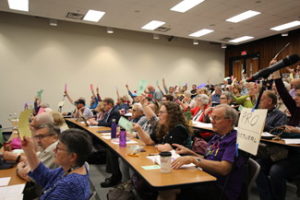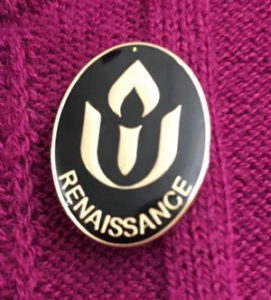CUC eNews: January 29, 2019 – Issue 75
In This Issue:
- New Motion for the 2019 Annual General Meeting
- Montreal Minister Active in Multifaith Coalition Against Proposed Religious Symbols Ban
- Barriers Remain to Accessing Medical Assistance in Dying
- Northern Lights: An Ongoing Success Story
- Vancouver Director of Religious Education Finds Value in Renaissance Training Program
- Reminder: Canadian Unitarian Online Book Club
- Upcoming Events You Won’t Want to Miss
New Motion for the 2019 Annual General Meeting 
The first motions package was sent out in early January, with a note in it promising a further motion on the Annual Program Contribution (APC). The new motion pertains to a recommendation from the Annual Program Contribution Task Force on an alternate method of calculation for the APC.
Please disregard the former package, and USE THIS ONE. You will find the additional motions on pp 9-12, and in Appendix C. Do read the motion carefully, discuss with your congregation, and provide feedback to treasurer@cuc.ca.
Please also note that there is a separate feedback form for these motions (Appendix E). Both feedback forms (one for the other motions, and the separate one for the APC motion) can be found here, for ease of use. Feedback for all motions is due by February 28th to the respective proposers.
Information about the AGM can be found here. Please note the change of location to The Atrium, 192 Spadina Ave, Toronto ON M5T 2C2.
Questions about the AGM? Email executivedirector@cuc.ca.
Montreal Minister Active in Multifaith Coalition Against Proposed Religious Symbols Ban

While the Quebec government may have created some ambiguity around its proposed ban on public servants wearing religious symbols, Rev. Diane Rollert of the Unitarian Church of Montreal is clear where she stands. Rollert was a strong opponent of a ban that was contemplated by Quebec’s former Parti Québécois government in 2013. Today, the current Coalition Avenir Québec (CAQ) government has announced plans to propose legislation that would ban the wearing of religious symbols by judges, police, and teachers. Rollert remains convinced that any such ban goes against Unitarian principles and the Charter of Rights and Freedoms, and would have negative effects if implemented, marginalizing the people it is ostensibly designed to liberate.
Back in 2013, Rollert was an author of, and signatory to, a letter on the issue addressed to Quebec’s then-Premier Pauline Marois. The letter, signed by more than 70 “women who believe in women”, argued that the debate surrounding the proposed “charter of values” was mainly focused on Muslim women, whom many proponents of the ban believe are oppressed by wearing religious head or facial coverings.
In the letter, Rollert and the other signatories agreed that they were also committed to avoiding the oppression of women, but argued that this is best achieved by ensuring women have access to education, public expression, and employment. The legislation, they contended, would threaten these rights by, for instance, forcing women to choose between wearing religious symbols and working.
Many other religious leaders were among the signatories to the letter, and remain among those working to oppose the new legislation, something Rollert says is indicative of a fairly broad consensus amongst various religions against the ban. Rollert is confident they will be able to present a united front.
“Certainly last time around, there was tremendous support and tremendous solidarity among religious groups”, she says, and “I expect to see the same thing this time around”.
Rollert believes it’s important to oppose the ban as a Unitarian, arguing it goes against principles including the right of conscience and the inherent worth and dignity of each person, and she believes it also violates the Quebec and Canadian Charters of Rights and the UN Declaration of Human Rights. But on a broader level, she believes, the ban should cause concern for everyone.
“There are people who will say to you, ‘well, it only affects a small number of people’”, she says. “But the problem is, when a majority starts to take away rights from minorities, that’s a very slippery slope in terms of our freedom”.
Read More About Rev. Diane Rollert
Barriers Remain to Accessing Medical Assistance in Dying
Although the road forward has been a long and complex one, medical assistance in dying (MAID) is now legal in Canada, and since 2016, over 3700 Canadians have accessed it. This does not, however, mean that accessing it has become quick or simple, for a variety of reasons. Here are some of the barriers that remain when it comes to MAID in Canada:
- Although a survey suggested a majority of Canadian physicians support access to MAID, a majority also reported declining to provide this service, citing lack of expertise, reluctance to deal with the emotional burden of ending a life, and — in a minority of cases — religious or ethical objections. Federal legislation makes clear that no one can be forced to provide medical assistance in dying against their wishes.
- Although physicians can’t be forced to provide MAID, uncertainty remains about the obligations of faith-based hospitals and long-term care homes, most of which decline to allow MAID on their premises. The Supreme Court’s ruling which legalized MAID didn’t address the question of whether these institutions should be exempt from having to provide this service, and the federal government has been silent on the issue.
- The federal government’s criteria for accessing MAID stipulate, among other requirements, that patients must be at least 18 years old; have a grievous and irremediable medical condition, and give informed consent to receive medical assistance in dying. A grievous and irremediable medical condition, in turn, means that the person requesting MAID must be at a point where their natural death has become “reasonably foreseeable”. This term lacks a clear definition and has caused some doctors to err on the side of caution by declining to provide MAID due to this uncertainty.
- In December 2016, the federal government engaged the Council of Canadian Academies (CCA) to conduct independent reviews related to specific types of requests for medical assistance in dying – requests by mature minors, advance requests, and requests where a mental disorder is the sole underlying medical condition. The CCA has since completed the reports, which as per its usual practice, do not make recommendations but rather synthesize the body of evidence. The reports largely concluded that there was relatively little evidence to consider in these cases, given the limited number of other countries that allow MAID, and the small number of such cases in those that do. The experts who compiled the reports also disagreed on many of the issues at hand.
Read More About the CUC and Assisted Dying
Northern Lights: An Ongoing Success Story
The CUC’s Northern Lights program is heading into a new year with a solid record of success. That should inspire congregations to try this unique fund-raising program.
The deadline for applications to the 2019 Northern Lights funding program is March 31. If your congregation is planning to apply, please let the Northern Lights committee know your intention as soon as you can – email us at northernlights@cuc.ca. We’d prefer to get that notice by February 1.
This program doesn’t award a grant: instead, the projects it selects get a list of donors who have pledged to support Northern Lights projects. These Chalice Lighter donors are the heart of Northern Lights.
Projects should be worth more than $5,000. Remember: to be selected as a Northern Lights project, you must have 20 percent of your own congregation signed up to be Chalice Lighters.
Back in 2012, Saskatoon was the first congregation to use Northern Lights – and it was an unqualified success. The congregation raised $11,750 from Chalice Lighters, plus other donations, to shift from a one-quarter time minister to a three-quarter time resident ministry. Since then the projects have varied. The UU Estrie congregation in North Hatley, Quebec, did a community outreach project. Comox Valley UUs bolstered their access to professional ministry. Mississauga UUs rebuilt an old barn to become a home for their youth and other congregational groups. The Halifax congregation used Northern Lights to hire professional staff for a strong Religious Education program.
Some projects are special: Northern Lights helped fund the creation of a CUC Truth, Healing and Reconciliation reflection guide for use by congregations and others. Most recently, “La Communauté Sans Frontières- Unitarienne Universaliste, CSF-UU” received a Northern Lights grant to connect French Unitarian Universalists around the world.
These successes are a result of the commitment of UUs across the country to become a Chalice Lighter donor. You can sign up to become a donor here on the CUC website. Or contact the Northern Lights team at northernlights@cuc.ca.
Vancouver Director of Religious Education Finds Value in Renaissance Training Program
 When Kiersten Moore began her tenure as Director of Religious Education at the Unitarian Church of Vancouver, she had no formal training and only a partial understanding of all the different aspects of the job at a large-size church. She was looking for some more inspiration and guidance on what it means to be a religious education professional and discovered a week-long session in North Carolina that would involve completing a module for the Renaissance program for people in her field. The week was a success, both in terms of the interactions it provided and the things she learned.
When Kiersten Moore began her tenure as Director of Religious Education at the Unitarian Church of Vancouver, she had no formal training and only a partial understanding of all the different aspects of the job at a large-size church. She was looking for some more inspiration and guidance on what it means to be a religious education professional and discovered a week-long session in North Carolina that would involve completing a module for the Renaissance program for people in her field. The week was a success, both in terms of the interactions it provided and the things she learned.
“That introduced me to more religious education professionals”, she says “and so being able to talk to colleagues just gave me a much clearer picture of the different aspects of my job other than just taking care of the children during the service on Sunday morning”.
Providing a comprehensive understanding of a religious education professional’s work is a key objective of the Renaissance program, a major component of the Unitarian Universalist Association (UUA) Religious Education (RE) Credentialing program. Each module provides standardized basic training in a specific area useful to religious educators, with topics such as curriculum planning, ministry with youth, and development. Since beginning the program, Moore has completed four more modules, some online and others in person, amounting to 75 hours of training.
“It’s given me a much broader long-range picture of work as a religious educator”, she says.
Although there have been many positive aspects to the program, Moore has found the ability to connect with colleagues one of its most beneficial aspects, noting that as much learning happens on a peer-to-peer basis as it does coming from the instructor. Each module concludes with participants working on a group project, which she says has led to ideas that have been implemented in participants’ own religious education programs. But the main takeaway, she finds, has been the new perspective it’s given her on work as a director of religious education.
“It’s enabled me to approach my work with the congregation in Vancouver in a way to really connect what I’m doing with the children to the larger conversation”, she says. “So to give them a sense, to give everybody a sense, to give children a sense of ownership and belonging, and a sense of home and a place within the congregation, and to help our adult members know the children and appreciate what they have to contribute specifically to the life of the congregation”.
Explore the Renaissance Program
Reminder: Canadian Unitarian Online Book Club
Winter has arrived in Canada, and wouldn’t it be nice just to curl up at home and discuss a good book with like-minded folks, without having to brave the weather? Come join our online discussion group. We meet monthly on Zoom. Send an email to canadian-unitarian-book-group+subscribe@googlegroups.com or contact Mary Maler (mmaler@videotron.ca).
Join the Canadian Unitarian Council on Facebook!
Upcoming Events
Share what’s going on in your congregation. Contact communications@cuc.ca
Deadline: the 14th of each prior month.
National Events
CUC 2019 Annual General Meeting (AGM), May 11 from 1:00 – 4:30 p.m. ET / 10:00 a.m. – 1:30 p.m. PT, The Atrium at Centre for Social Innovation, 192 Spadina Ave (please note change of location).
CanUUdle XIX, May 17 – 20 – Hosted by the Unitarian Church of Calgary
CanUUdle is the annual national conference for Canadian UU youth and their adult advisors.
Registration will be available soon.
Chorus, May 17 – 20, Edge Camp Retreat Centre, AB
Each year, Canadian UU young adults (18-35) gather to build beloved community, deepen our cross-country connections, and grow as spiritual beings. Chorus will be held at River’s Edge Camp & Retreat Centre near Calgary. Registration will be available soon.
Regional Events
30th Annual Southern Ontario Midwinter Retreat, February 1 – 3
All UU’s are welcome to this retreat, organized by Southern Ontario UUs, at the YMCA Cedar Glen Retreat Centre in Bolton, ON.
International Events
Equity in Action: Gender in an Intersecting World, April 11-13, 2019, New York City
The UU United Nations Office is excited to host this year’s Intergenerational Spring Seminar on gender equity in collaboration with the UU College of Social Justice. Programming will be interactive and intergenerational, encouraging participants to challenge their assumptions, connecting their activism with grounding in UU faith, and empowering them with the tools to bring back to their communities to make change locally and globally.
Youth and Young Adult
Gathered Here: Young Adult Check-In, 2-11, 3-11, 4-8, 5-6, 6-10, 7-8, 8-12, 8 p.m. ET
Gathered Here is a monthly online check-in and gathering for Canadian Unitarian Universalist young adults.
Peterborough Self Care UU Youth Con, Friday, January 22 – Sunday, February 24
Unitarian Fellowship of Peterborough, Ontario
Webinars
Worship as a Beacon for Congregational Growth, Saturday, March 30, 9:30 – 12:30 p.m. PT (6:30 – 9:30 p.m. ET)
Part one of two, we’ll explore ways to create meaningful worship that engages minds, hearts, and spirits. Our presenter is the Rev. Dr. Barbara Wells ten Hove.
Connecting Across the Generations, April 13, 12:30 – 2:30 p.m ET
Churches are one of the few places (outside of our own families) where we can make friends across the generations. How can we use that niche to build a sense of community, trust, connection, and care? Facilitated by Asha Philar, CUC’s Youth and Young Adult Ministry Specialist.
Roundtables and Virtual Gatherings
Practical Applications of Social Media, February 9, 12:30 p.m. ET
A followup to the December webinar on social media. Facilitated by Margo Ellis, this roundtable drills down to the practical aspects of how congregations use social media?
Virtual Gathering: Hope in Hard Times, Wednesday, March 6, 7 – 8:30 p.m. ET 0r Saturday, March 9, 12:30-2:00 p.m. ET
Arising out of common concern, voiced by religious professionals, we invite people to join in this time of reflection and sharing – looking at the ways we find Hope in Hard Times.

